Features
Mythology in Video Games
Of Gods and Men.

What Makes Games About Gods So Popular?
There is a reason why the myths and legends of old have endured to this day. There is a reason why they are still so loved. They are the embodiment of good storytelling–simple, relatable plots presented at an epic scale; and clearly defined, archetypal characters whose personalities and nuances can be embellished by each storyteller, be they in books, films, or video games.
For example, the Norse myth of Utgardaloki (otherwise known as Utgard Loki)–a tale in which Thor and Loki travel to a castle in the land of the giants, ruled by the titular giant Utgardaloki, only to be tricked by their host–is simply a tale of boastful guests and pranks gone wrong. Of course, these being gods, the boasts are tremendous and the pranks even more so (such as tricking Thor into believing he was wrestling with Utgardaloki’s elderly grandmother only to later reveal that he was wrestling the embodiment of Old Age itself).

These stories are universal, and they range from good versus evil epics to hubristic tragedies to fables of morality and ethics, and everything in between. Every story type and every genre is represented somewhere in mythology. Yet their plots are just vague enough to be retold in countless new ways, and they all come with ready-made and well-known characters.
The gods all have their defined personalities and the stories their important plot beats and twists, but what is said and how it all unfolds is, ultimately, down to whoever is telling the story. Hades can come across as a vindictive, manipulative mastermind trying to overthrow his brother Zeus, or a petty, mistreated pariah exacting his revenge through more underhanded methods. Thor could be the shining paragon of truth and justice, using his hammer Mjolnir only as a last resort, or he could be a drunken lout whose solution to every problem is to smash it till it’s dead. It all depends on the person telling the story and the kind of story they are trying to tell. And that versatility makes gods and myths perfect for video games.

New Myths and Old
Of all the myths and legends, the Greek and Norse are by far the most popular. Every one of their tales is in the public domain, readily available and free to use by anyone. Because of this, because of their malleability, and because they are so well-known to most Western audiences, it’s no wonder so many writers have taken inspiration from Greek and Norse myths in their games.
This inspiration can manifest in many forms, from forming the basis of the entire world to lurking, almost unseen, in the background. The Uncharted and Tomb Raider games are prime examples of the latter, with the big treasure Nate and Lara are willing to kill a few hundred nameless goons for being based on legends of old. From El Dorado and Shambala in Uncharted, to Yamatai and even Thor’s hammer Mjolnir in the Tomb Raider series, mythology provides the perfect backdrop to hang a thrilling adventure on.
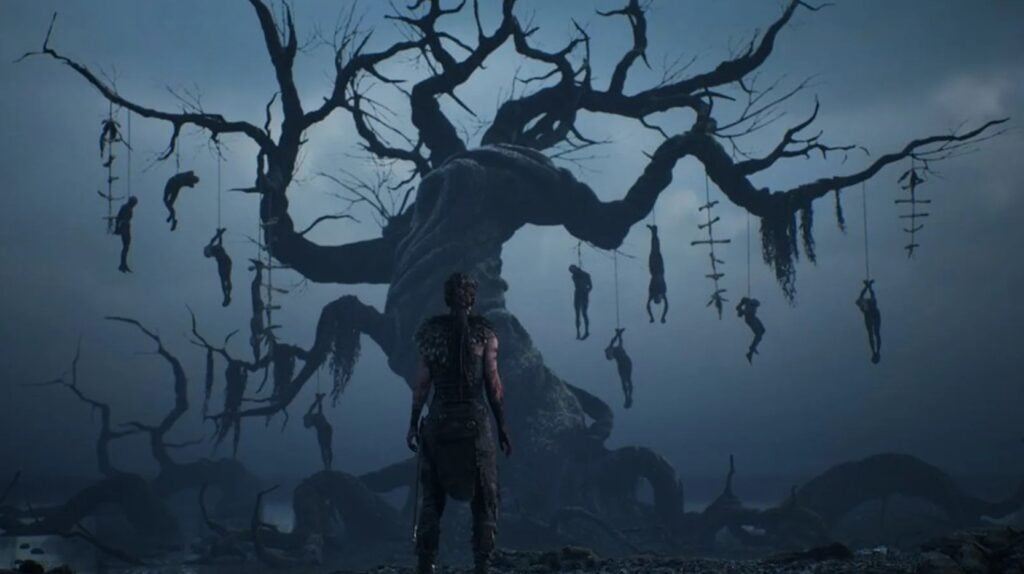
Some games take it a step further by setting their story in a world where these myths are believed to be real, worlds like that of Hellblade: Senua’s Sacrifice. Here is a game that uses Norse mythology to complement its themes. In Hellblade, players take control of Senua as she travels to Helheim to retrieve the soul of her lost love, battling spectral warriors and ancient gods along the way. But are these foes real, or just manifestations of Senua’s hurt and fractured psyche? The game even includes stone monoliths inscribed with old Norse legends – legends which tell of the folly of ego and the hubris of revenge.
Other games dive in completely, recreating the worlds of the gods as fully realized places. Hades, the indie roguelike from Supergiant Games, is a perfect example of this. Hades takes the Greek gods we thought we knew and adds its own spin on them, fleshing them out with full personalities, complicated interconnected relationships, and its own unique brand of lovable, quirky humor and charm. These gods are so well-written that players simply cannot get enough of them, and may actually start dying on purpose just to get back to the Underworld to see if they have anything new to say.
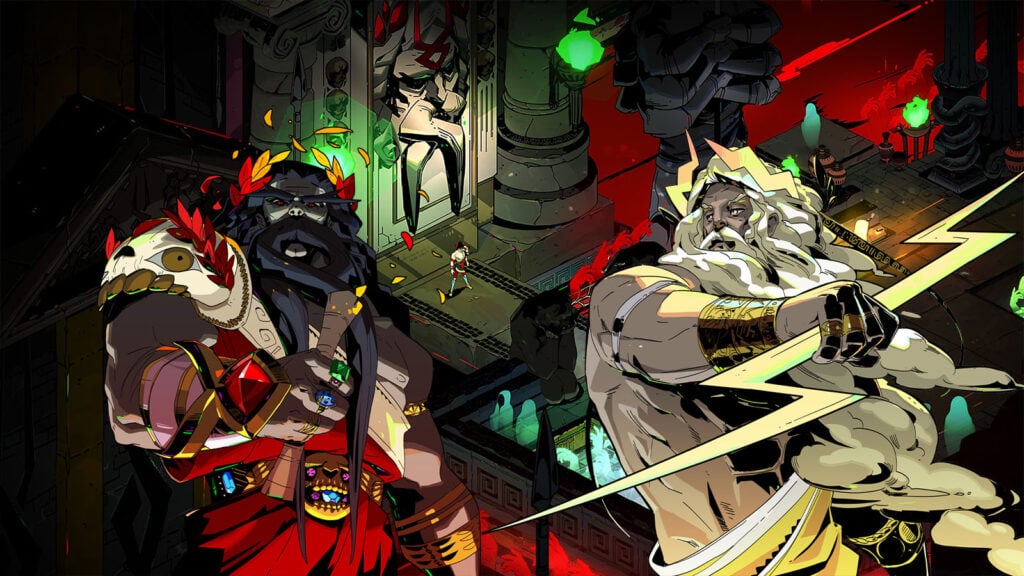
Those Who Came Before
The Assassin’s Creed series falls into a strange middle ground, where the mythologies of the past take a back seat to the main story, but play a key part in the series’ meta-narrative and alternate history.
Those Who Came Before, otherwise known as the Isu or the First Civilisation, are a human-like race of beings so advanced that the first humans considered them gods. They even created the human race and used them as slaves, further cementing their status as gods in the human’s eyes. But their civilization was lost in a great calamity and by the time of Assassin’s Creed 1, they are all but forgotten, with only a few artifacts and temples to attest to their former greatness.
In those early games, very little is known about Those Who Came Before. Their existence and motivations are only teased towards the end of each game’s main story, once the immediate threat has been dealt with, as well as through optional collectibles scattered throughout the open world. These snippets tease a great mystery, and lend the Isu an almost Lovecraftian sense of unknowable power and design, allowing the player to try to fill in the gaps as best they can.
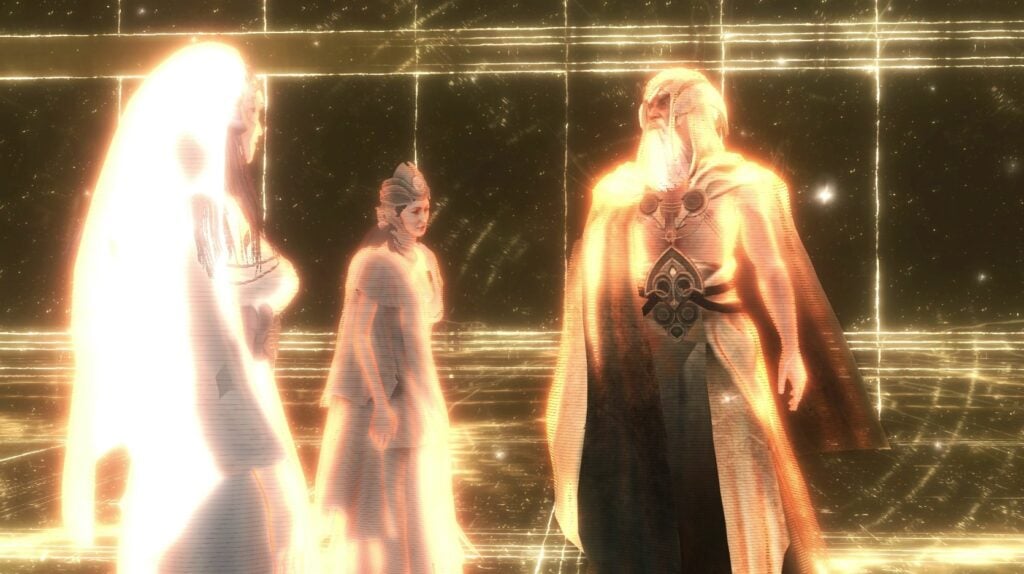
However, as the games progressed, and writers and directors quit or were replaced, the Isu began to change. Where once they were simply the inspiration for gods and myths – with names like Jupiter, Juno, and Minerva, their exploits formed the basis of legends which became more and more embellished with each passing century–all of a sudden (and for intents and purposes), they were the gods of the myths. Gone was any subtly or sense that history was twisted over time by lesser minds who did not fully comprehend what they saw or heard. Now Kassandra was running around Atlantis itself, chatting with Poseidon and Persephone, and Eivor was drinking mead in the halls of Asgard and fighting Fenrir and ice giants.
In the games’ lore, these aren’t meant to be 100% literal translations of the First Civilisation, but interpretations of what happened as perceived by the protagonists’ minds, but they still feel very jarring. The true look of Asgard might be that of a pure white, futuristic city and not the Viking stronghold Eivor perceives it as, but the stories that take place there actually happened to these ancient Isu, in one form or another. And, to me at least, that greatly detracts from the mystery of the First Civilisation and what they were set up to be. Knowing too much about Those Who Came Before takes something away from them, and the myths Ubisoft chose to tell and present as real history don’t befit them, or make much sense in the meta-narrative as a whole.
Assassin’s Creed started out as a shining example of how to use mythology well, but its bright spark slowly faded as the series wore on.
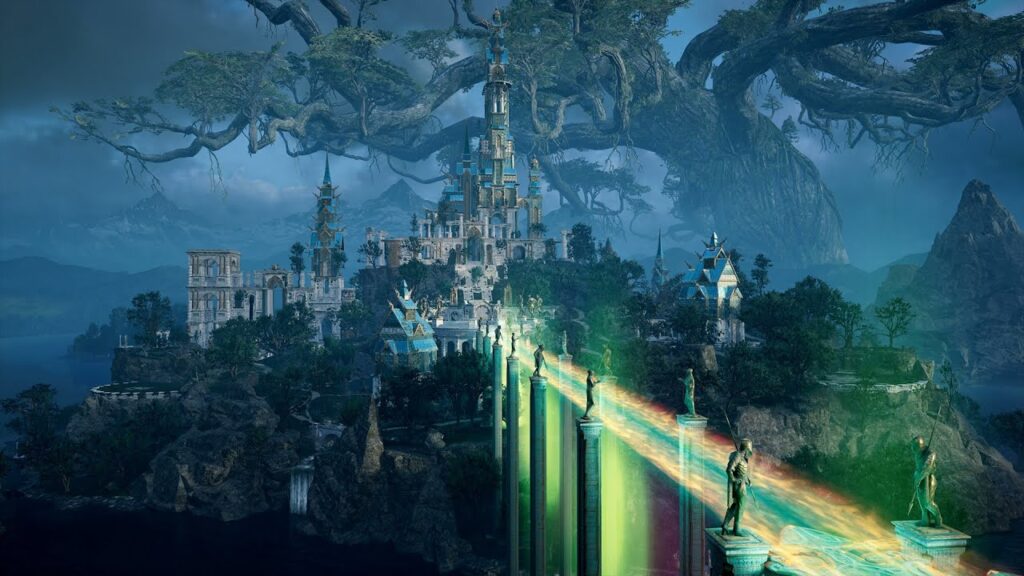
A God Among Games
By far the very best series to draw its setting and characters from mythology is none other than God of War.
From the original Greek trilogy to the new Norse duology, the God of War series toes the line perfectly between remaining faithful to the old myths and adapting them for a new audience. The games are not afraid to add their own spin on the gods and legends we thought we knew. And doing so allows the games’ writers to take risks, to rework these ancient, occasionally one-dimensional gods into fully-realized three-dimensional characters who complement the story’s themes, and who can play the role of friend or foil to Kratos as naturally as any modern creation.
The gods of old were selfish and rude. Zeus would do whatever he could to catch the eye of any mortal woman he desired, and would subsequently use his powers to escape any responsibility for his actions. Hephaestus was bullied and mocked by the other gods and cast out from Mt Olympus, simply because they saw him as misshapen and different. Odin coveted power and control above all else, and like Zeus, happily resorted to trickery and theft to get what he wanted. Loki, too, was a trickster, finding mischievous glee in disrupting the dwarven smiths’ work, selling Mjolnir, or shaving off Lady Sif’s hair, just to see what would happen. All of the gods had their flaws, but in God of War, those flaws are embraced.

There’s a reason the gods of God of War are worshipped. They are arrogant, evil, petty things. They got to where they are through ruthlessness and single-minded resolve, and kept their power through a careful balance of awe and fear. And so when Kratos comes to disrupt that balance, they stop at nothing to put him down.
Revenge was the theme of the first trilogy, and the Greek pantheon suited it perfectly. These gods thrived on revenge – Zeus only took power by taking revenge on his father Kronos, cutting him open to free his devoured siblings and casting the Titan down to Tartarus; Heracles killed his family when driven mad by a curse from a jealous Hera. Something the games themselves echoed, with Aries possessing Kratos and forcing him to kill his wife and daughter forming the catalyst for his quest for revenge.
The original trilogy even showed the consequences of killing a god (a sentiment Kratos was keen to impress on his son Atreus in God of War 2018). These gods hold true power over their realm, keeping nature in check, and killing them unleashes chaos. By the time his quest is over, Greece is a mess to say the least. Pestilence and plague run rampant, most of the land has been swallowed by the sea, and without Helios to pull it across the sky, the sun will never rise again. One can only imagine the state Midgard will be left in at the end of God of War Ragnarök.
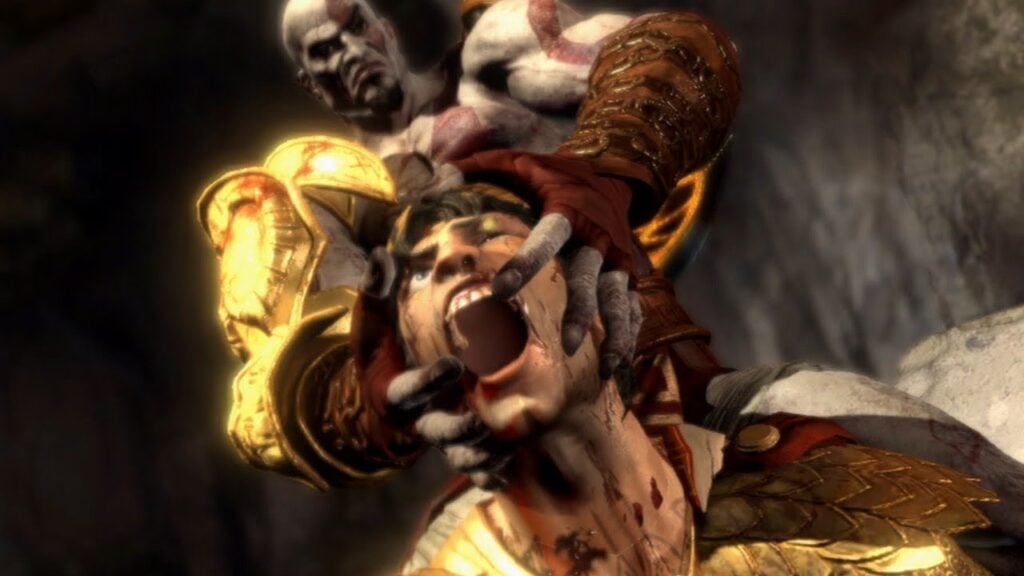
The theme of the latest duology is family, and in that, the Norse gods are an inspired choice. In God of War 2018, Kratos has left his old life behind in search of peace, and has settled down to start a new family. And when his wife dies, he tries his best to raise his son right. But Odin won’t allow that. The All-Father does not trust the giants or their offspring, for he has glimpsed the future, and wishes to see them eradicated from all corners of the Nine Realms. Yet he doesn’t deal with the threat himself, it’s below him, instead, he sends his son, Baldur, and Thor’s sons, Magni and Modi, to do the job for him.
Considering Kratos’ past, this does not end well. Together with his son Atreus, they defeat and kill Baldur, Magni, and Modi, and incur the wrath of their parents.
Freya, Baldur’s mother and former ally to Kratos, has sworn her revenge; Thor, notorious for swinging his hammer at the slightest provocation, is now out for blood; and Odin, All-Father, will not allow such a threat to his existence to continue drawing breath. These are the consequences for killing a god in God of War 2018, and they shall come to a head in God of War Ragnarök.
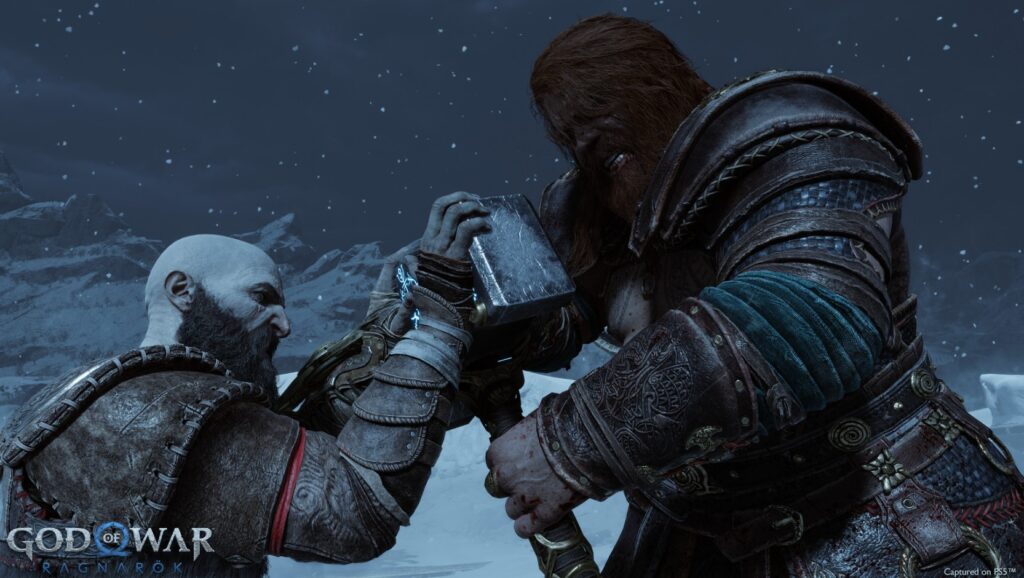
This is how you use mythology and gods in video games, you make them real people, you give them families, hopes, and fears, and you make them suffer. You bring all their might, all their glory, down upon the player, and you give the player the tools to fight back.

-

 Features4 weeks ago
Features4 weeks agoGet Ready: A Top Isekai Anime from the 2020s Is Headed to Hulu!
-

 Features3 weeks ago
Features3 weeks agoSocial Gaming Venues and the Gamification of Leisure – A New Era of Play
-

 Features3 weeks ago
Features3 weeks agoSolo Leveling Snubbed?! You Won’t Believe Who Won First at the 2025 Crunchyroll Anime Awards!
-

 Culture3 weeks ago
Culture3 weeks agoThe Global Language of Football: Building Community Beyond Borders
-

 Technology4 weeks ago
Technology4 weeks agoIs Google Binning Its Google Play Games App?
-

 Technology4 weeks ago
Technology4 weeks agoHow to Download Documents from Scribd
-

 Guides4 weeks ago
Guides4 weeks agoBoosting and WoW Gold: Why Prestige and Efficiency Drive the Modern MMO Player
-

 Technology2 weeks ago
Technology2 weeks agoGamification and Productivity: What Games Can Teach SaaS Tools
-

 Features2 weeks ago
Features2 weeks agoFarewell to a Beloved 13-Year-Old Isekai Anime That Brought Us Endless Laughter
-

 Features1 week ago
Features1 week agoThis Upcoming Romance Anime Might Just Break the Internet; Trailer Just Dropped!
-

 Features3 weeks ago
Features3 weeks agoWait, What?! Tom & Jerry Just Turned Into an Anime and It’s Glorious!
-

 Culture2 weeks ago
Culture2 weeks agoIs the Gaming Industry Killing Gaming Parties?






















